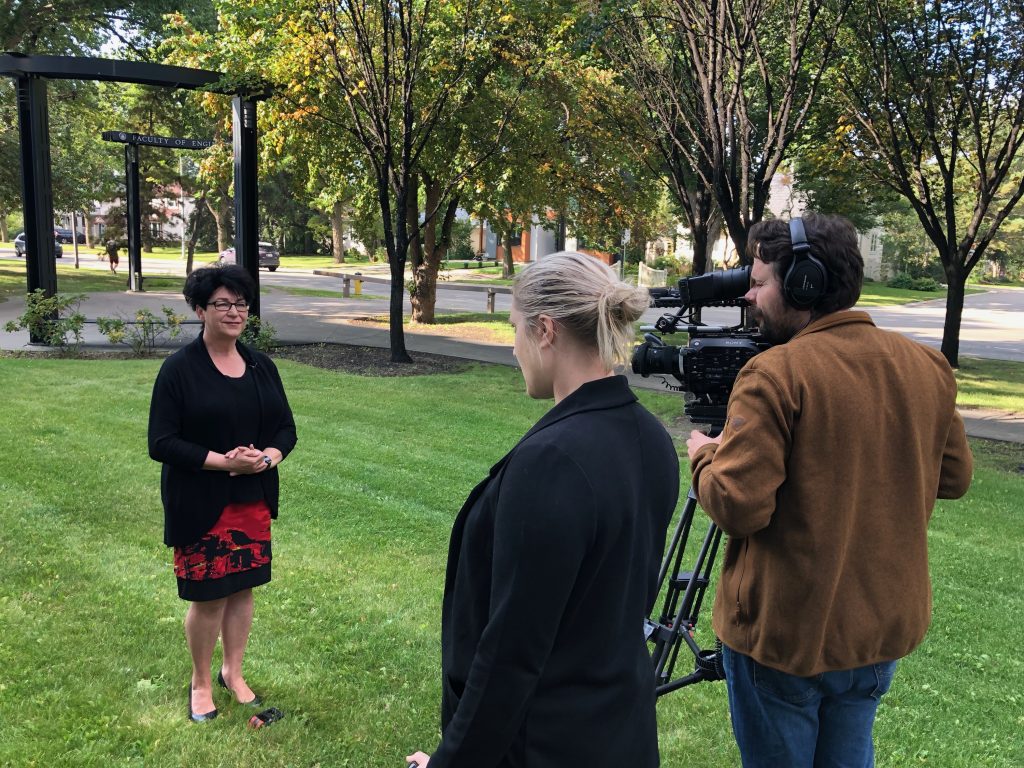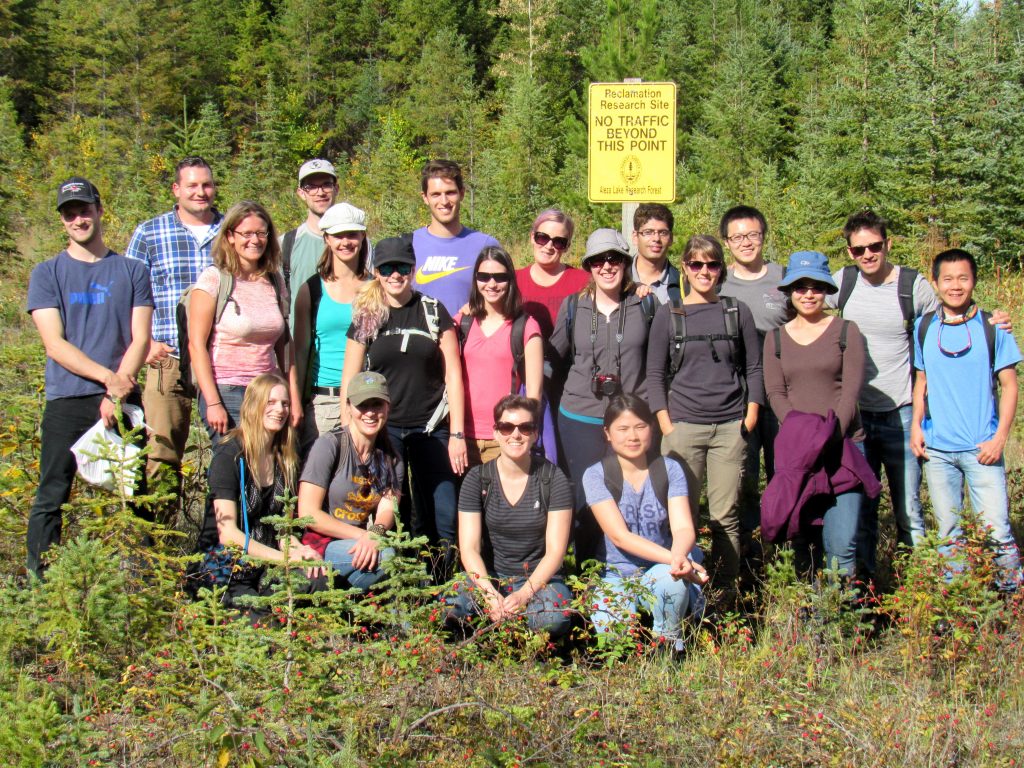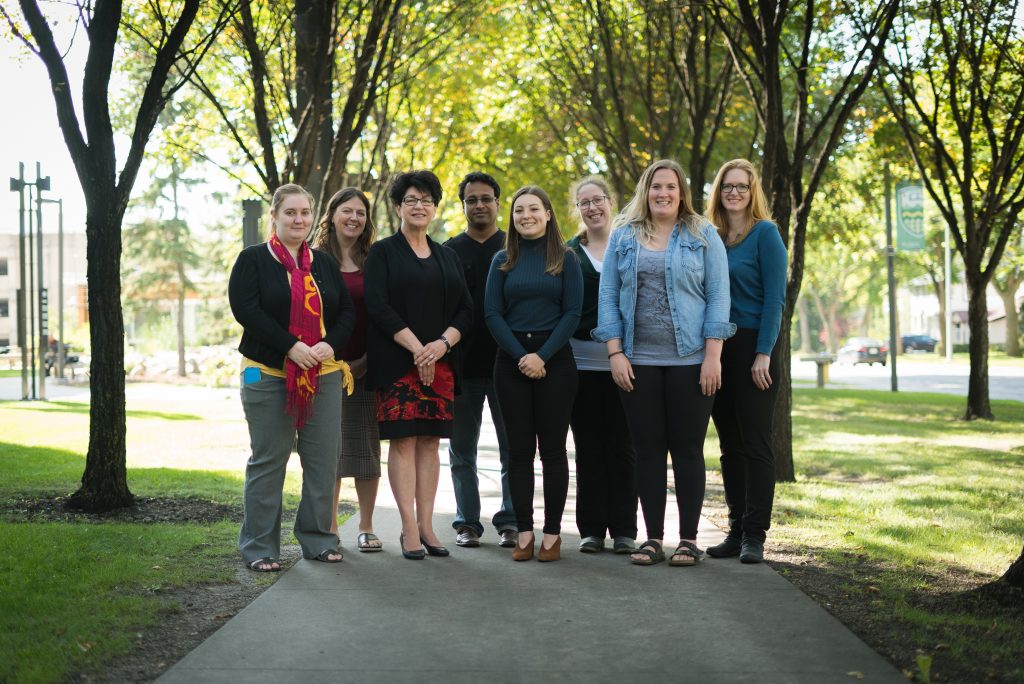
Sharing the history of LRIGS and future steps.
Lights, camera, action! A film crew recently visited campus to showcase the University of Alberta’s Land Reclamation International Graduate School (LRIGS) after it was awarded the Alberta Emerald Award for Post-secondary Education, recognizing and celebrating its outstanding environmental achievements.
The film is part of a series of mini documentaries produced by the Alberta Emerald Foundation, highlighting the winners of the 28th Alberta Emerald Awards. The awards are unique to Alberta, as the only accolades of their kind in Canada that showcase environmental excellence across all sectors.
Fittingly then, LRIGS is the first school of its kind in Canada and around the world.
LRIGS is the brainchild of Dr. M. Anne Naeth. In 2011, she and her colleagues started LRIGS with a five year grant in 2011 from the Natural Sciences and Engineering Research Council Collaborative Research and Training Experience Program (NSERC CREATE). As well as serving as a professor of land reclamation and restoration ecology in the Department of Renewable Resources, Naeth is now the Director of Future Energy Systems and the Energy Systems Signature Area.
These responsibilities keep her busy, but LRIGS remains close to her heart. “The Land Reclamation Graduate School was actually an idea I had when I was a graduate student,” explains Naeth, Director of LRIGS. It’s an area she’s remained passionate about ever since, and one she hopes to inspire others to follow.

LRIGS students in the field learning about land reclamation.
“Land reclamation is essentially healing the land after it has been damaged,” says Dr. Valerie Miller, recent graduate of LRIGS and current Outreach and Engagement Coordinator. Increasing human population and resource requirements result in greater damage to land, with over 50 % of land now altered by human activity. “One of the greatest challenges of this generation will be to reclaim disturbed lands to ensure land and resources for the future,” Miller asserts. To her and Naeth both, this makes training of land reclamation professionals essential.
That remains the central goal of LRIGS — to train land reclamation professionals that are the best in their field. To that end, the program is open to all undergraduate and graduate students and post doctoral fellows at the University of Alberta engaged in land reclamation and related environmental research or programs. “Graduate in the name refers to the value added training and higher level education,” Naeth explains.
The variety of work done by students is a key benefit of LRIGS considering how multidisciplinary the work is. Students may be focused on anything from soil building and revegetation to public policy and government regulations to engineering. They work in sites across Alberta, Canada and the rest of the world. Students come from a wide range of backgrounds — engineering, biology, environmental science, arts — as Miller explains, “we all come together to increase our knowledge in land reclamation.”
Another value – LRIGS connects students with experts through lectures, panel discussions, short courses, field trips, networking events and a mentorship program. They are exposed to the science of land reclamation as well as economics, social and cultural components.
“What makes the school unique is really the fact that it is more than just getting a degree, we are helping students to prepare for life as a professional, a career as a professional,” said Dr. Naeth. “And for them to develop and learn about the soft skills that will supplement the basic scientific background that they have.”

Part of the LRIGS team. Photo credit Hoopla Media and Colleen Nuc.
The international focus of LRIGS is a key strength of the program. With participating students from many countries, experiences are shared. “Land reclamation is something we’re all involved in, and should all be involved in because we all have a responsibility to the planet,” shares Dr. Naeth. Understanding differences and commonalities in how land reclamation and environmental issues across countries and cultures are addressed inspires students to ask new questions and find innovative solutions.
LRIGS is committed to developing current and future land reclamation professionals and to reduce the human footprint on the planet. Receiving the award points to the success of the partnerships and programs developed over the past eight years with industry, government and the public, nationally and internationally. “Even with the original funding over, there’s a strong interest in keeping the LRIGS program going,” Naeth says.
Land reclamation will remain an essential part of land use in the future. With 2021-2030 designated as the Decade of Ecosystem Restoration by the United Nations, continued education, research, collaboration and innovation in land reclamation are essential.
Here LRIGS can play a significant role, as its participants and organizers continue to make a difference in the world we share.
To learn more about LRIGS, check out https://lrigs.ualberta.ca/ and the mini-documentary produced by Hoopla Media and the Alberta Emerald Foundation https://www.youtube.com/watch?v=fT0rABLpVRU.
Alberta Emerald Awards are bestowed every year in 12 categories ranging from small and large businesses to education programs and not for profits to government and individuals. Winners and finalists are selected by a panel of knowledgeable judges with cross-sectoral experience. To learn more about the Emerald Awards, click https://emeraldfoundation.ca/emerald-awards/!
By Valerie Miller

